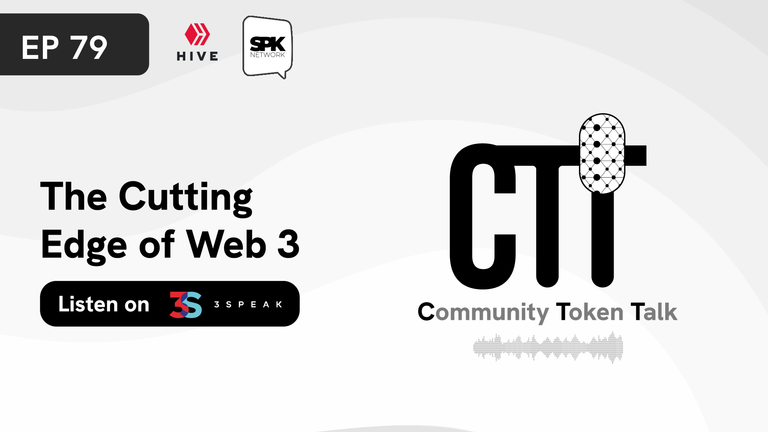Community Token Talk Podcast - Ep. 79 | Latest in Web3

The CTT Podcast is hosted by @starkerz and @theycallmedan, co-founders of @threespeak.
https://twitter.com/CryptoTea_/status/1678952026372284416?s=20
https://twitter.com/disclosetv/status/1679420891971694593?s=46&t=OLP9Eftmt_CvREIM895u8w
https://twitter.com/gladstein/status/1679351361488711680?s=20
https://twitter.com/saylor/status/1679643739927486467
https://twitter.com/ura_soul/status/1679819254227509249
https://twitter.com/bradmillscan/status/1680040620868370432?s=46&t=POh6SsfIeeYEAXvQkaCHBQ
SPK Network YouTube Channel
The rewards from these posts are split among:
@bil.prag - He helps us make shorts on the @spk.network account and the YouTube Channel.
@enrique89 - Marketing and design.
And @eddiespino - Eddie helps download all the episodes from Twitter space, gather all the important links, and post the episodes to 3Speak.
SPK Network LinkTree
3Speak LinkTree
▶️ 3Speak
Congratulations @cttpodcast! You have completed the following achievement on the Hive blockchain And have been rewarded with New badge(s)
Your next target is to reach 60 posts.
You can view your badges on your board and compare yourself to others in the Ranking
If you no longer want to receive notifications, reply to this comment with the word
STOPTo support your work, I also upvoted your post!
Check out our last posts:
Hmmm, sounds familiar.
Can hive get a distribution that doesn't give 50% of the inflation available for ~10k daily users to less than 20 people?
Not today, that is for sure.
Maybe tomorrow.
Great one!
Here is a detailed summary article about the key topics discussed in this episode of the Community Token Talk Podcast:
Proof of Access and Decentralized Storage
The hosts discussed the recent developments around proof of access, a new system being built on the Hive blockchain. Proof of access allows users to pin content to their IPFS nodes and have that storage validated and rewarded by the network. This creates a decentralized, peer-to-peer storage system that is incentivized autonomously.
The hosts explained that this is a crucial foundation for building truly decentralized web3 applications, as it allows heavy data like videos to be stored off-chain in a censorship-resistant way. They highlighted how the proof of access system on the SPK Network uses elected validators and variable time/value contracts to make the storage incentives flexible and community-driven.
The hosts encouraged listeners to get involved by trying out the proof of access system, pinning content, and providing feedback. They see this as a major step forward in creating sustainable, decentralized infrastructure that cannot be easily shut down or controlled by centralized entities.
Centralized Stable Coins and CBDCs
The hosts were critical of efforts by entities like Liquid to distribute centralized stable coins in the global south. They argued that these are essentially Trojan horses for central bank digital currencies (CBDCs), as they are controlled by centralized parties and can be censored or confiscated.
In contrast, the hosts promoted the use of decentralized, algorithmic stable coins like Hive's HBD as a better alternative for building circular economies and achieving true financial sovereignty. They warned that the proliferation of centralized stable coins is a dangerous trend that will ultimately lead to greater centralization of power.
The XRP Court Case and Bitcoin Price Volatility
The hosts discussed the recent developments in the XRP court case, where a judge ruled that XRP is not a security. However, they noted that the implications are not as clear-cut as some have suggested. The hosts argued that the centralized nature of XRP, with a large pre-mine controlled by Ripple, is a more fundamental issue than its legal classification.
The hosts also commented on the volatility in the Bitcoin price following the XRP ruling, with an initial rally that was quickly reversed as the market realized the nuances of the decision. They saw this as an example of the leverage-driven speculation that plagues crypto markets, and argued that it is healthy for these "leverage long boys" to be flushed out periodically.
The Dangers of Centralized Web3 Efforts
The hosts were highly critical of figures like Jack Dorsey and his Nostra project, arguing that it represents a centralized, globalist vision for the internet that is antithetical to true decentralization and freedom. They contrasted this with the community-driven, censorship-resistant model being built on Hive and other decentralized platforms.
The hosts warned that efforts to regulate or shut down decentralized platforms will ultimately fail, as the community can simply spin up new "whack-a-mole" instances that are impossible to control. They see this as an inevitable clash between centralized power structures and the unstoppable force of decentralized, community-owned infrastructure.
Overall, this episode highlighted the hosts' steadfast commitment to building truly decentralized, censorship-resistant systems that empower individuals and communities, in contrast to the centralized efforts they see as dangerous Trojan horses. The discussion of proof of access, stable coins, and the broader web3 landscape underscored their vision for a future where people have true digital sovereignty.
Notice: This is an AI-generated summary based on a transcript of the video. The summarization of the videos in this channel was requested/approved by the channel owner.